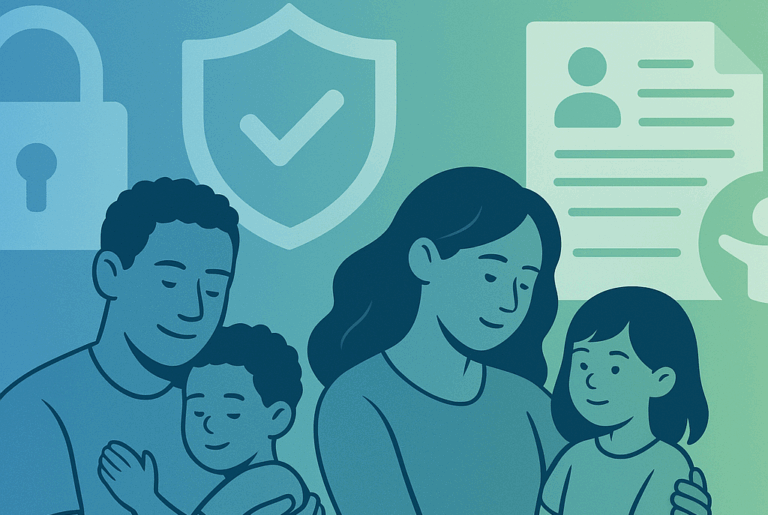In Child Support and other family services programs, trust is everything. These programs serve as lifelines for families and children, managing sensitive personal information from financial records and custody agreements to addresses and social security numbers. That’s why ensuring the privacy and security of this data is not just an IT concern. It’s a mission-critical priority.
As agencies modernize their operations and increasingly rely on digital tools, the need to safeguard sensitive information has never been more important. A data breach can jeopardize services, expose families to fraud or harm, and severely damage public confidence. Agencies must adopt strong security practices that prioritize encryption, access control, and compliance with federal and state privacy regulations to build trust, maintain integrity, and deliver reliable services.
Why Data Security Matters in Family Programs
Child Support and family services programs manage a high volume of confidential data that is regularly shared across agencies, with courts, and sometimes with third-party service providers. While all of this helps to ensure delivery of comprehensive services, it is quite complex and creates multiple potential points of vulnerability.
When security is compromised, the consequences are serious. Personal information could be exploited for identity theft or fraud, children’s safety could be put at risk, and trust in the system can erode—undermining the very support network that families depend on.
Implement Strong Encryption Standards
Encryption is the foundation of any effective data security strategy. It protects information at rest and in transit, ensuring that, even if data is intercepted or accessed without authorization, it remains unreadable.
Agencies should use advanced encryption protocols for stored data and for transmitting data between systems. This includes communications with external partners like court systems or other agencies.
Best practices include:
- Encrypting all personally identifiable information (PII)
- Using secure, encrypted portals for document exchange with clients and stakeholders
- Regularly reviewing and updating encryption standards to keep pace with emerging threats
- Encryption isn’t just a protective measure—it’s a powerful tool for building client trust.
- Enforce Robust Access Control Measures
One of the most common ways data is compromised is through unauthorized access. Whether it’s a phishing attack, misused credentials, or a former employee retaining access, agencies must have tight controls over who can access what.
Access control strategies should include:
- Role-based access control (RBAC): Ensuring users only access the data necessary for their role
- Multi-factor authentication (MFA): Adding an extra layer of protection beyond passwords
- Audit logs and user tracking: Monitoring who accesses what data and when, to detect anomalies and enforce accountability
By putting safeguards in place, agencies reduce the risk of internal and external breaches while improving operational integrity.
Stay Compliant with Privacy Regulations
Federal and state privacy laws provide a framework for protecting client information—but staying compliant is a moving target. Agencies must stay informed of evolving regulations and build processes that align with them.
Key regulations include:
- HIPAA (when medical information is involved)
- IRS Publication 1075 (for federal tax data)
- FERPA (when education records are relevant)
- OCSE security requirements for Child Support systems
- State-specific privacy and record-keeping laws
To remain compliant, agencies should:
- Conduct regular risk assessments and audits
- Maintain clear documentation of policies and staff training
- Partner with legal and IT experts to ensure systems and workflows meet all requirements
Building a Culture of Security
Technology alone isn’t enough. A secure agency is one where every team member understands their role in protecting sensitive information. Agencies should invest in ongoing training, implement clear security policies, and prepare incident response plans for fast action in the case that a breach occurs.
Transparency with clients is also key. When families understand how their information is protected, their confidence in the program and their willingness to engage grows.
How NCT Supports Secure Service Delivery
At NCT, we understand the importance of secure service delivery. Our enterprise content management (ECM) solution, CaseWorks, is built to support Child Support and family services programs with comprehensive tools for document management, workflow automation, and data protection.
Security features include:
- End-to-end encryption
- Role-based permissions and access controls
- Audit trails for user activity
- Secure client portals for document submission and communication
CaseWorks is also designed with compliance in mind, helping agencies stay aligned with federal and state privacy regulations while improving efficiency and transparency.
Elevating Service Delivery With Secure Systems
Securing sensitive data in Child Support and family services programs isn’t optional. It’s essential. With the right tools and best practices, agencies can protect client information, comply with regulations, and build the trust that’s needed to serve families effectively.
By adopting solutions like CaseWorks, agencies take a proactive step toward safeguarding their operations and strengthening the safety net that so many families rely on. In a world where privacy is paramount, strong data security is the foundation of better service.






